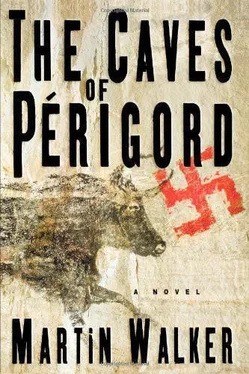Martin Walker - The Caves of Perigord
Здесь есть возможность читать онлайн «Martin Walker - The Caves of Perigord» весь текст электронной книги совершенно бесплатно (целиком полную версию без сокращений). В некоторых случаях можно слушать аудио, скачать через торрент в формате fb2 и присутствует краткое содержание. Жанр: Триллер, на английском языке. Описание произведения, (предисловие) а так же отзывы посетителей доступны на портале библиотеки ЛибКат.
- Название:The Caves of Perigord
- Автор:
- Жанр:
- Год:неизвестен
- ISBN:нет данных
- Рейтинг книги:4 / 5. Голосов: 1
-
Избранное:Добавить в избранное
- Отзывы:
-
Ваша оценка:
- 80
- 1
- 2
- 3
- 4
- 5
The Caves of Perigord: краткое содержание, описание и аннотация
Предлагаем к чтению аннотацию, описание, краткое содержание или предисловие (зависит от того, что написал сам автор книги «The Caves of Perigord»). Если вы не нашли необходимую информацию о книге — напишите в комментариях, мы постараемся отыскать её.
The Caves of Perigord — читать онлайн бесплатно полную книгу (весь текст) целиком
Ниже представлен текст книги, разбитый по страницам. Система сохранения места последней прочитанной страницы, позволяет с удобством читать онлайн бесплатно книгу «The Caves of Perigord», без необходимости каждый раз заново искать на чём Вы остановились. Поставьте закладку, и сможете в любой момент перейти на страницу, на которой закончили чтение.
Интервал:
Закладка:
He was putting himself out to be charming, with considerable success. Lydia, who had been fretting about the suitability of her ivory silk dress with a red scarf and shoes, felt herself relaxing quickly. Not too quickly, Lydia, she warned herself.
“Mademoiselle Dean, or if I may call you Lydia, you are far too beautiful to keep calling me Monsieur le President. It makes me feel even older than I am. If you must call me anything, call me Francois, since we are all off duty and at our ease and you are my most welcome guests. I have to suffer far too many formal occasions, so indulge me in a happily private one.” There was a distinctly jolly twinkle in his eye, and Lydia recalled reading one or two scurrilous accounts of his romantic reputation. It had probably done him no harm with the voters.
“I’m afraid, sir, that a very thorough look through my father’s papers found no draft of his memoirs, just a few jotted notes and chapter headings,” said Manners. “They were mainly about North Africa, rather than his time in France. There were a couple of letters to my grandmother, one which mentioned meeting you in the summer of 1942, after the Gazala battles and Bir Hakeim, and another about the visit you paid to our home. Apparently Granny rather took to you.”
“Probably because I told her that I thought your house was a great deal more comfortable than my own. More attractive, too.” He turned to Lydia. “Don’t you find this house a terrible muddle? Not knowing whether it is an old fortress or a comfortable chateau-quite apart from the place being back to front.”
“It is rather distinctive, monsieur-I mean, Francois.”
“Thank you, Lydia. You say my name charmingly. Well, it would have been good to have had the memoirs of such a distinguished old soldier and great friend of France,” said Malrand. “I want to hear all about this rock painting of his that you found, and whether the police are going to get it back, but that had better wait until our final guest arrives. I asked her to come a little later, to give us time to chat, and Lydia, you know about these things. What do you think of my fireplace?”
“Renaissance, Italian-style, quite early. Good marble, pity about the damage to the caryatids,” she said automatically.
“German bullets. Used it for target practice after I was arrested,” Malrand said. “Anything else?”
“Yes, the plaque,” she said, bending to peer at the great irregular iron plate attached to the rear of the fireplace, to bounce its heat back into the room. “It’s marvelous. Are those your family arms?”
“No,” he said with a wink at her and a wicked grin at Manners. “The English did not win all their wars, whatever they like to think. They are the arms of the Talbots, a great English family, and my ancestors looted it from their chateau down the river after we kicked the last of the English out five centuries ago. Not long afterward, that Malrand’s great-grandson invaded Italy with Francis the First in 1515.”
“The invasion that brought the Renaissance back to France,” Lydia said.
“Yes, and the fireplace.” Malrand turned to Manners. “We did our best to pass the Renaissance on to you English a few years later, at the Field of the Cloth of Gold. But your King Henry the Eighth was more interested in women, I think. Understandable, of course.”
“Why do you French and English tease each other so?” she asked, smiling to take any offense from the question.
“Joan of Arc, Trafalgar, and Waterloo,” said Manners. “I suppose the French think we have a lot to answer for.”
“There were battles that went the other way-Hastings, Calais, La Rochelle, Fontenoy,” Malrand snapped. Then he caught himself. “No, it’s not that. That’s not what I want to say. After all, during the Revolution, it was Frenchmen who made my palace into a public dance hall, Frenchmen who turned Notre Dame de Paris into a temple of reason, and held a mock mass with a prostitute on the main altar. Ah, the English, what can I say about the English? They who gave me refuge and guns and hope and helped me come back to liberate my poor France.” He gazed off into some private space.
“It’s an intimacy, like an unending Catholic marriage in a family too poor to own more than one bed,” he went on. “We have fought, invaded each other, loved each other’s women, fought alongside each other for a thousand years. There are no two peoples on earth who have shared so much, and stayed so different, and yet retain this profound, almost frightening attraction for one another. You drink our wines, we drink your scotch. You English holiday here, fall in love with old France and buy houses. Our young French people fall in love with your music and your tax laws and open businesses in Kent. I have a young great-nephew who tells me he will be a millionaire when he launches his computer company later this year. He went to Brighton to learn English, fell in love, started a company, and now his children are English.”
Malrand paused, his mood too intense to be interrupted, sipped some champagne, and took out a cigarette. Instead of lighting it, he walked across to Manners, and put his hand on the Englishman’s shoulder. “Sometimes I think we are twins, you and I, separated at birth. Sometimes I think of that old Greek legend of the man and the woman constantly trying to reunite into the original whole. Your father, you know, was as close to me as my brother.”
“That reminds me, sir,” said Manners. “I thought you might appreciate some memento of my father, and when he first gave me this, he said it came from the war, from France.” He reached into his jacket pocket and brought out the leather chess set Lydia had seen in the car.
Malrand took it, opened the flap, and looked at the tiny chips of ivory with black and red chess symbols painted onto the rounded ends. The thinner ends slotted into tiny slits cut into the checkerboard of light and dark squares on the leather. “I remember him with this, playing chess with McPhee,” the President said softly. “It came from a dead German.” He passed his hand gently over the leather. “I am very glad to have this. Thank you. But it must come back to you someday.”
From the courtyard below came the racing blip of an engine, a squeal of brakes, and the almost tidal roar of the gravel being plowed up by a car being driven too fast and stopped too quickly. Lydia looked out of the window to see dust rising from behind a small Japanese convertible, with Clothilde merrily flashing her legs at the security men as she took off her high heels to skip through the gravel to the entrance stairs.
The President’s white wine had been extremely good, Lydia thought, dry enough to counter the richness of the crayfish salad, and yet with enough fruit and flowers to hold up well on its own. She nibbled a little bread, and sipped it again. In London, she’d paid over ten quid a bottle for a Chablis that was a lot less appealing than this.
What she really wanted to know was whether Clothilde had already enjoyed the presidential favors, or was she simply trying rather hard to do so. She was not quite flirting, but nor was she being the cool, professional Clothilde of her meetings with Lydia’s bosses and the police and the insurance men back in London. She was being witty, gay, and just a little irreverent about the changing fashions in interpreting the cave paintings. Lydia knew the Abbe Breuil had seen them as a hunting ritual, portraying the beasts that the tribes needed to catch and eat. That had always seemed quite reasonable to Lydia as a hypothesis, although she remembered reading that the bones left in the middens of their campsites seldom came from the bison and horses that were most frequently depicted. They mainly ate reindeer, as she recalled, which were not that common in the cave art.
Читать дальшеИнтервал:
Закладка:
Похожие книги на «The Caves of Perigord»
Представляем Вашему вниманию похожие книги на «The Caves of Perigord» списком для выбора. Мы отобрали схожую по названию и смыслу литературу в надежде предоставить читателям больше вариантов отыскать новые, интересные, ещё непрочитанные произведения.
Обсуждение, отзывы о книге «The Caves of Perigord» и просто собственные мнения читателей. Оставьте ваши комментарии, напишите, что Вы думаете о произведении, его смысле или главных героях. Укажите что конкретно понравилось, а что нет, и почему Вы так считаете.












